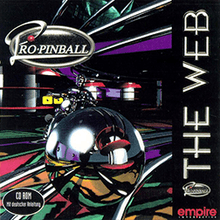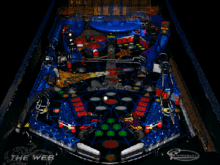Pro Pinball: The Web
Pro Pinball: The Web (Pro Pinball in North America) is an action video game developed by Cunning Developments for PlayStation, MS-DOS and Sega Saturn. It is the first game in the Pro Pinball series.
| Pro Pinball: The Web | |
|---|---|
 | |
| Developer(s) | Cunning Developments |
| Publisher(s) | |
| Series | Pro Pinball |
| Platform(s) | PlayStation, MS-DOS, Sega Saturn, Macintosh (Mac OS 9 or earlier) |
| Release | PlayStation MS-DOS
|
| Genre(s) | Action |
| Mode(s) | Single-player, multiplayer |
Background
Pro Pinball: The Web uses graphics pre-rendered from an intricate 3D model.[1] Consequently, the game had superior graphical capabilities to other popular pinball games of the time, while playing at full speed on MS-DOS. The Web supports screen resolutions up to 1024x768 with 32,768 colours, and features Red Book CD-DA audio tracks.[2]
Gameplay

Pro Pinball: The Web is a pinball simulation in which players operate a virtual pinball table. Players can score extra points by making combos, i.e. performing a move twice in a row.[3] Hitting targets at the far end of the table activates the game's missions, in which the player must hit lighted ramps or bumpers to score bonus points. Completing a mission results in a huge point bonus.[3]
Reception
| Reception | ||||||||||||
|---|---|---|---|---|---|---|---|---|---|---|---|---|
| ||||||||||||
The PlayStation and Saturn versions received mixed reviews. While critics praised the realistic pinball graphics and physics[4][5][7][8] and the wide variety of scoring opportunities,[4][5] they criticized the voice samples[4][7] and the absence of a directly overhead view.[4][5] Some also concluded that with only one table, the game would get old very quickly,[4][5][8] though a reviewer for Next Generation remarked, "While many developers have tried to wow gamers with multiple tables, Empire went the other way - giving the player one table, but doing it right."[7] Jeff Gerstmann of GameSpot concluded that it "is a convincing simulation of pinball, but it falls short when compared to other video pinball games."[5] Rob Allsetter of Sega Saturn Magazine assessed that "All in all, this is a decent enough interpretation of the game itself, let down only by the exclusion of different table to variate the action a little",[8] and Dan Hsu of Electronic Gaming Monthly said, "It's a great board, but it'll get old real quick."[4]
Reviewing the PC version, Tim Soete highly praised the game's realism and summarized that "its high-resolution graphics and true table physics combine to make it one of the most immersive pinball titles out there."[6]
The Web was named the 64th best computer game ever by PC Gamer UK in 1997. The editors wrote, "Nothing else has quite come close [...] to Pro Pinball's utterly convincing physics and slick presentation."[9]
References
- "Compatibility - Pro Pinball: The Web - CodeWeavers". www.codeweavers.com. Retrieved 2010-11-29.
- "Pro Pinball - The Web - Technical Specifications". Archived from the original on 1999-05-01. Retrieved 2010-11-29.
- "Pro Pinball: Weaving a New Kind of Pinball". Electronic Gaming Monthly. No. 88. Ziff Davis. November 1996. p. 232.
- "Review Crew: Pro Pinball". Electronic Gaming Monthly. No. 88. Ziff Davis. November 1996. p. 80.
- Gerstmann, Jeff (December 1, 1996). "Pro Pinball: The Web Review". GameSpot. Retrieved 15 November 2017.
- Soete, Tim (September 26, 1996). "Pro Pinball: The Web Review". GameSpot. Retrieved 15 November 2017.
- "Pro Pinball". Next Generation. No. 26. Imagine Media. February 1997. pp. 122, 124.
- Allsetter, Rob (August 1996). "Review: Pro Pinball The Web". Sega Saturn Magazine. No. 10. Emap International Limited. pp. 86–87.
- Flynn, James; Owen, Steve; Pierce, Matthew; Davis, Jonathan; Longhurst, Richard (July 1997). "The PC Gamer Top 100". PC Gamer UK (45): 51–83.